- Home
- Patricia MacLachlan
Unclaimed Treasures Page 2
Unclaimed Treasures Read online
Page 2
Willa tried to think of someone else—another possible true love. But they’d only moved to the house a week and a few days ago. The only boy she’d met was Porky Atwater across the street. Porky and his family, who all looked alike. Was it six or seven Porkys she’d met? But Nicholas would never believe that. Porky was only nine and spent most of his time sitting on the curb, sucking Popsicles that made colored trails down his bare chest and into his pants. No, Nicholas would never believe Porky.
Willa brightened. “Horace,” she said cheerfully. “It’s Horace.”
“Horace,” scoffed Nicky. “It’s not Horace, though you could do much worse. I like Horace. He’s honest, and I like the way he eats apples.”
Willa frowned. She knew a bet was a bet. There was nothing she would have liked more than for Nicky to lose the bet and have to do her chores—vacuum the living room and her father’s study, and make salads all week. Willa hated vacuuming. All the dust and dirt crept back so that you had to vacuum again. But mostly she hated making salads. All that work cutting up, when it was eaten and mixed together under the teeth anyway. Willa always wished that she could put a head of lettuce, a tomato, a cucumber, two carrots, and a stalk of celery on the table and tell people to eat up. Willa sighed. Their bets, though, Nicky and hers, were always honest. Had always been honest and would always be so.
Willa shrugged her shoulders. “You’re right. I’ll take out the garbage and water the plants and set the table all week.” Willa made a face. Setting the table was another tiresome task. The dishes and the silverware just got dirty again in a second. There must be a better way, like eating over the stove from the pots.
“Well,” said Nicky, suddenly shy and uneasy. “Well,” he repeated, bewildered because Willa had given up so easily.
Willa stood up and walked out of the bedroom and down the hallway to set the breakfast table. Nicky scrambled up and hurried after her. She turned her head to one side, listening. Willa could tell he had more to say just by the way he walked.
“All right, all right,” said Willa, stopping so abruptly that Nicky ran into her. It didn’t hurt. She wasn’t bigger than Nicky, just seven minutes older. And fiercer.
Nicky smiled at her, then held out his drawing for her to see. Willa, trying to appear disinterested, glanced at it casually. Nicholas had drawn Willa, wrapped around her bedpost, her lips puckered. The bedpost, though, had sprouted an array of arms, all pushing Willa away. Willa couldn’t help smiling.
“That’s wonderful, Nicky.”
“Willa,” said Nicky softly. “There will be trouble, Willa. And you’ll be sad.”
“Sad, bad,” said Willa, turning around again. She walked downstairs briskly, pretending to ignore him. But she couldn’t ignore his message. For as sure as Willa knew she was the fiercer twin, she knew now and had always known that Nicky was wiser.
Willa lay on the Oriental rug in her father’s study, watching the dust motes move in the sun above her head. The vacuum cleaner lay next to her, a body with a tangle of cord and hose. Willa loved her father’s study, the light slanting through the hanging plants, making the calm reds of the rug gleam, touching the piles of papers on his desk. Whenever Nicholas or Willa vacuumed the study they were cautioned not to touch a paper, never to move a book. This warning came after Nicholas had once put the hose in the wrong end of the cleaner and papers had blown in a cyclone of sound. He had stood there, fascinated, a slight smile on his face, until Willa had pulled the plug and their father had plunged into the room uttering words that Willa had not known how to spell to look up in the dictionary. Their father taught writing at the college, and he had cursed his students who had not numbered their pages. He cursed them most days anyway, and later, when he had calmed down, he had told Nicholas that pages out of order improved some of their stories. “Most of them,” he had said with a sigh. After that Willa spent hours in his room, reading. She marveled that there could be so many different stories—so many words, names, places.
“You know what?” Willa had said to her father. “If you put all the letters of the alphabet in a box, there is every story ever written. Every story possible.”
Her father, surprised, had looked up from his desk. Thoughtfully he had lighted his pipe, making the familiar sucking noises. “It sounds simple enough, doesn’t it, Willa?” He had peered closely at her. “You know, I think I will keep letters in a box right here to remind myself how simple it sounds.” He leaned back in his chair, puffing on his pipe. “And just how hard it really is,” he added.
The box of letters lay on his desk, close to the window of plants. The wooden-backed letters, letters from a printer’s tray, lay tumbled inside. Willa opened the lid with one finger and stared at the Z and the B and the F. An A lay on its side; the others were turned over. “Sounds simple . . . but how very hard it is.” Willa thought of her father’s words. Lots of things were hard and sounded simple. Vacuuming, thought Willa. And making salads. Finding your true love.
A pile of student stories lay on the desk blotter, waiting for her father. Willa picked up the top page and began reading.
It was nighttime. Ted and Wanda stood on the terrace, looking at the stars. Wanda’s eyes were on the sky, but Ted’s eyeballs rolled all over Wanda’s body . . .
Willa smiled and sat down in her father’s chair. Sex and flutterings, she thought. And eyeballs. Nicky would like this.
Willa glanced at the vacuum cleaner. She put her feet up on the desk, leaned back, and read. The vacuum cleaner lay silent and forgotten in the sun.
3
“Pssh, pssh.” The sounds were clear through the open windows of Willa’s bedroom. Half asleep, she thought they were left over from her dream, a dream of Ted and Wanda, bathed in moonlight.
“Pssh, pssh.”
Willa rubbed her eyes, raising her head from the pillow, listening. She got up and looked out her window. Across the small, sloping stretch of yard that separated her house from her true love’s there was an apple tree, old and gnarled. It had survived years of drought and winter kill and uncertain prunings by the Treasures, though everyone spoke of it as dying. Had spoken of it as dying for a long time, Horace had told Willa.
This morning Horace and Nicholas were frantically chasing the cats. One cat was clinging to the trunk of the apple tree as Horace held her. Willa could hear the scrabbling sounds of claws against bark. Porky Atwater, pushing a wheelbarrow of rags, was coming up the sidewalk, hissing into bushes and trees. Willa grabbed her bathrobe and ran down the back stairs barefooted. The grass was startling and cold with dew, and Willa grinned suddenly with the feel of it. “There’s Bella-Marie,” spoke an ancient voice, “out for a breather.” Willa saw that the rags in Porky’s wheelbarrow were not rags. They were Old Pepper, Porky’s great-grandfather, a dried apple of a man—nearly one or two hundred years old, Willa thought. He had left his teeth at home, and his mouth fell into his face. He wore a rugby shirt, bright yellow and black, and he looked like an old bee.
“Why is Porky hissing at bushes?” Willa asked Horace, after he and Nicholas had pushed the cats inside the house. She sat beside him on the steps. “And who is Bella-Marie?”
“Bella is Old Pepper’s pet parrot,” whispered Horace. “And hissing attracts birds. Didn’t you know that?”
“Of course I knew that,” said Willa grumpily, though she had no idea that hissing attracted anything.
Old Pepper wore all his clothes today. Old Pepper was forgetful and independent and forgiven for all of it. Sometimes he forgot his clothes, though he never wandered naked from his own backyard. He went birding there “starkers,” as Horace put it, blending in well with the plants and bushes. “Looking lots like Adam in the first garden, even though he has a mustache and wears half glasses,” said Horace. “Innocent, like a naked baby at the beach.”
Old Pepper peered up into the apple tree as Porky hissed.
“Aha!” he croaked. “I see you, Bella!”
There was a sudden flapping of bright wing
s high in the tree. “Bug off!” screeched Bella. “Bella’s on holiday!”
“Holiday my foot come home I’ve got mangoes,” exclaimed Old Pepper, who often spoke in run-on sentences. He struggled out of the wheelbarrow, arms flailing. Porky grabbed Old Pepper as he weaved, while Bella shrieked and glared at them from above. The cats were fierce against the kitchen window, tails whipping, eyes wild.
Willa, Horace, and Nicholas ducked under the tree and looked up. Bella peered down at them, turning her head from side to side as she moved nervously sideways on her branch.
“Holiday no mangoes!” she shrieked.
Old Pepper staggered under the tree, nearly stepping on Willa’s bare foot. He shook his fist. “Be nice!” he yelled. The effort of shouting and shaking his fist almost tipped him over, but Porky staunchly kept him upright. “Be nice,” said Old Pepper, more softly.
“Be nice how do I love thee let me count the ways,” answered Bella.
Horace, Nicholas, and Willa burst into laughter, and Bella laughed back at them, flying down to a lower branch. She was a beautiful bird, mostly red with a few touches of green and yellow, almost too bright for the tree.
Nicholas swung easily to the first branch of the tree. “I’ll climb up,” he called to Old Pepper. “Maybe that will get her down.”
“No, no, no, no, no” came a shout from the back door. It was Aunt Crystal, waving her hands in the air. “That tree is not for climbing, Nicholas. It is old and dying.”
“Never,” added Aunt Lulu, looking over Aunt Crystal’s head. “Never. Its limbs are most dead. It is not a trustworthy tree.”
“Crazy,” muttered Old Pepper, glaring at Aunt Lulu. “My limbs are old and most dead, too. But I am as trustworthy as I ever was.”
“Not trustworthy, not trustworthy,” repeated Aunt Crystal, shaking her head with her hands over her ears.
“Crazy, never, no,” chanted Bella from the tree.
Aunt Lulu held up a warning finger. “Never,” she said sternly, “never climb that tree.” And then she and Aunt Crystal disappeared into the house again.
There was a silence. Willa smiled at Old Pepper and looked up.
“Beautiful Bella,” she called softly. “Come down, beautiful Bella.”
Bella stared at Willa for a moment, then, squawking, she flew down and sat in the wheelbarrow, gnawing on the wooden side with her beak.
Old Pepper grinned at Willa, then mumbled his way over to the wheelbarrow and climbed in.
“Dumb bird,” he said lovingly, putting his arm around Bella. He waved to Porky. “Let’s go, Pork. Take the dumb bird home for a mango.”
“Dumb bird,” said Bella. “Dumb bird for a mango.”
Bella settled into the crook of Old Pepper’s arm, and slowly, the wheelbarrow squeaking a bit, Porky pushed them off.
“Holiday,” they could hear Bella say.
“We’ll take a holiday, Bella,” said Old Pepper, nodding his head. “We’ll wheelbarrow around the block.”
Silently, Nicholas and Willa and Horace watched them. Then Willa sighed, sitting down on the grass, leaning against the trunk of the apple tree.
“What a pair,” she said softly. “What a pair.”
The back door opened and Aunt Crystal looked out.
“All in order?”
“All in order,” called Horace Morris. “They’ve gone.”
“Well, then,” said Aunt Crystal, letting the three frantic cats outside, “we can get about our birding.”
Aunt Crystal had changed into boots and ballooning knickers and a billed hat that sat on top of her gray curls.
“Lulu!” she called, her voice high like the last note of a song.
Lulu came around the corner of the house, pulling a wire shopping cart. In the cart were bird books, a blanket, and a huge paper bag. Aunt Lulu, as always, wore high-heeled shoes, though today she wore camouflage pants with them. “I’ve got the books, the blanket, and”—she waved a thermos at Aunt Crystal—“the punch with a little something fierce.”
Together they went off, one striding, the other teetering, with an every-so-often hiss at a bush.
Willa grinned and turned to Horace.
“The paper bag?”
“Lunch,” said Horace Morris. “A good bird has to fly over a picnic blanket once in a while, they say.”
“What a pair,” said Nicholas, repeating Willa’s words.
The three of them lay down in the grass, and Willa turned to look at Nicholas. Nicholas was staring up into the tree.
“What are you thinking about?” she asked.
“I’m thinking,” said Nicky slowly, “that Aunt Crystal and Aunt Lulu shouldn’t have said never.”
“Never what?” asked Horace, propping himself on one side.
Willa sighed, staring up into the leaves again.
“He means never climb the tree,” she said. “Nicholas loves trees. And you never tell Nicholas no.”
“You never tell Willa no, either,” commented Nicholas, still staring.
Horace laughed and lay down again.
“What a pair,” he said.
Willa put her hands behind her head and closed her eyes. “Be careful, Nicholas,” she said so softly that Horace didn’t hear.
“Hush, Willa,” said Nicholas.
Willa smiled and settled back into the grass. She thought about Nicholas and his dreams of climbing the old untrustworthy apple tree; of Aunt Crystal and Aunt Lulu off birding on their blanket; and of Old Pepper and Porky and Bella on a brief holiday around the block. She looked over at Horace, and for some strange reason, she was comforted to see that Horace had taken an apple, shined and quite large, from his pocket, and was beginning to eat it, spitting the peels in a neat pile in the grass beneath the apple tree.
4
“Oh Ted,” she whispered, her lips brushing the alligator on Ted’s sweater.
“Wonderful Wanda,” Ted murmured, stroking her sprayed shiny hair and her shoulder, still warm from wind sprints.
“Oh Ted,” cried Wanda. “In the moonlight, you look like a Greek god.”
“I know,” said Ted. “I know.”
Willa held the manuscript in one hand, moving the vacuum cleaner idly in the other. Back and forth, back and forth. Willa could not remember ever seeing her father stroke her mother’s hair. And in the moonlight, her father always looked happy and comfortable and tired, her mother huge, growing daily like a mammoth firefly.
There was a metallic sound, and Willa knew she had sucked up some paper clips. Paper clips, much like dust and dirt, were the natural by-product of her father’s work. Willa turned off the cleaner and went to her father’s reference library to look up Greek gods. There was a book dedicated to the subject, large with bold print and pictures. The men, Willa noticed, were muscular with sweet faces and fig leaves. The women had sweet faces, too, and no shirts. They all looked quite content in spite of the shortage of clothing.
Willa sighed at the vacuum cleaner and went over to her father’s record player. The record still sitting there collecting dust was her favorite, the Pachelbel Canon. That meant her father hadn’t changed the record since she had last vacuumed. Willa turned on the record, and the music, quiet and gentle, filled the room. First position, second position, third, hands reaching, arabesque. Willa danced. The music, as always, made her into something other than Willa. Wanda, perhaps? No, not Wanda, standing in the moonlight, her breath on Ted’s alligator. Suddenly, there was Willa’s mother in the doorway, huge, smiling. Then she was dancing with Willa. First position, the whale, second position, the elephant, her hands strangely lovely and thin, the hippo doing fifth position, a plié. Turning with Willa. Willa smiling in spite of herself. What a pair, thought Willa, echoing Horace and Nicholas under the tree. Her mother’s long hair had come loose from its combs. There were damp wisps around her face, and her cheeks were flushed. Willa and her mother grinned at each other, and then the final strong chords of the canon came. With a flourish they ended their dance
, Willa’s mother collapsing heavily in a wing chair by the fireplace, Willa on the floor next to the vacuum cleaner.
“Mama?” Willa caught her breath and sat up. “You’re good!”
Willa’s mother smiled, and wiped her forehead with the back of her hand. “You know, there was a time when I wanted to be a dancer.”
“You?” Willa exclaimed. “You?” she said more softly, struck by the sudden look of hurt on her mother’s face.
Her mother nodded, lifting her feet together and studying them over her huge stomach. She turned them from side to side, arching them, pointing the toes. “Yes, me. When I met your dad I was taking four company classes each week.”
“Four?” Willa was astonished. “But what happened? Why did you stop?”
Her mother shrugged and tucked her feet under her. “I don’t really know that anything happened,” she said. “I married your dad. Then I had you and Nicholas.” She smiled at Willa. “I didn’t know there would be two of you, you know.”
Willa stiffened. Is that our fault? she thought. Is that what you really mean?
“But you should have kept on dancing. It’s important,” said Willa.
“Having you and Nicholas was important, too,” said her mother. “There are different kinds of important, Willa.”
Wrong, thought Willa. Wrong. She thought of Horace’s mother out in the world doing something important. Something extraordinary. She would be tall and sleek-haired, dancing somewhere, perhaps. Or playing bouncy music on an organ in a restaurant while people ate mushrooms. She would be wearing lavender eye makeup and a fur coat and diamonds the size of apricots. After each performance she would eat chicken salad or toasted cheese sandwiches (Willa’s favorites) by candlelight. There would be waiters in red jackets with brass buttons waiting to light her perfumed cigarette in its sequined holder. There would be ice-cream sundaes with sprinkles for dessert (another of Willa’s favorites). And a tall, splendid, solemn-eyed man, much like Horace’s father but not Horace’s father, would be there, looking loving over the appetizer.

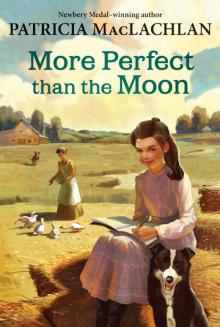 More Perfect Than the Moon
More Perfect Than the Moon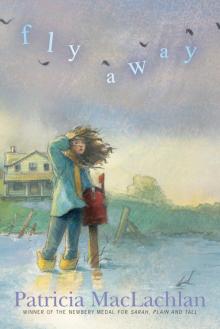 Fly Away
Fly Away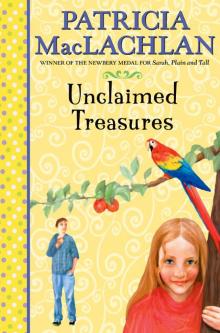 Unclaimed Treasures
Unclaimed Treasures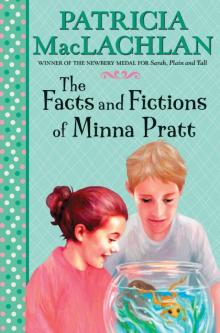 The Facts and Fictions of Minna Pratt
The Facts and Fictions of Minna Pratt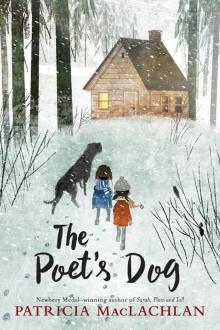 The Poet's Dog
The Poet's Dog Journey
Journey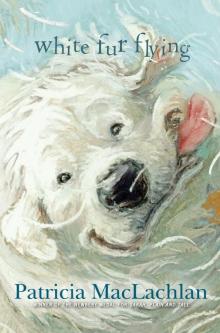 White Fur Flying
White Fur Flying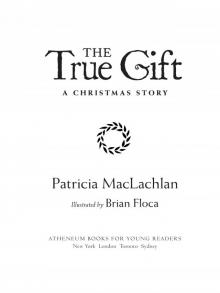 The True Gift: A Christmas Story
The True Gift: A Christmas Story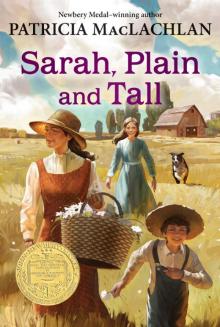 Sarah, Plain and Tall
Sarah, Plain and Tall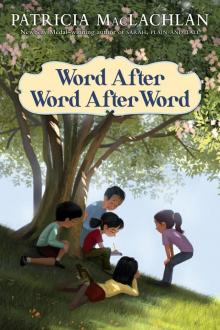 Word After Word After Word
Word After Word After Word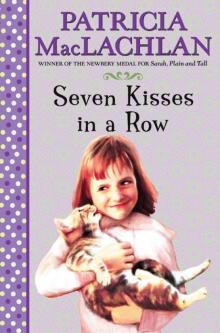 Seven Kisses in a Row
Seven Kisses in a Row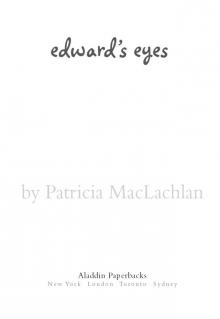 Edward's Eyes
Edward's Eyes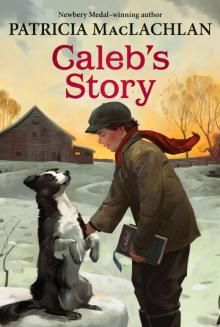 Caleb's Story
Caleb's Story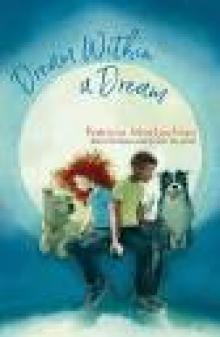 Dream Within a Dream
Dream Within a Dream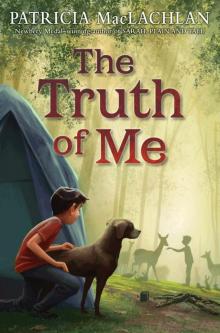 The Truth of Me
The Truth of Me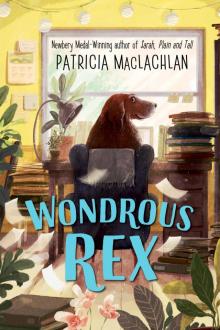 Wondrous Rex
Wondrous Rex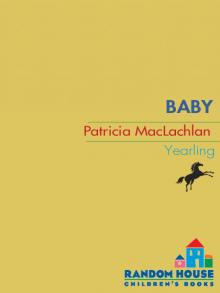 Baby
Baby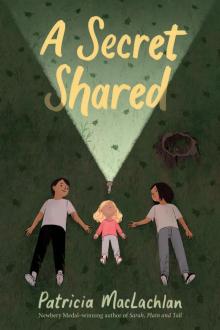 A Secret Shared
A Secret Shared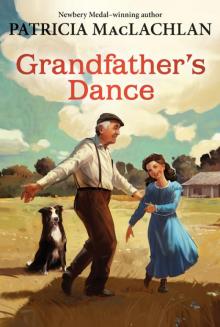 Grandfather's Dance
Grandfather's Dance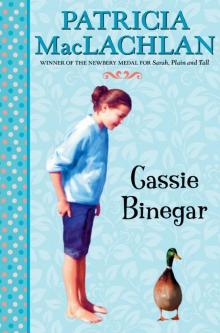 Cassie Binegar
Cassie Binegar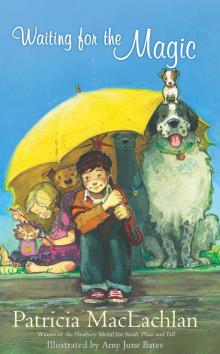 Waiting for the Magic
Waiting for the Magic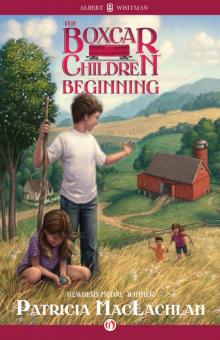 The Boxcar Children Beginning
The Boxcar Children Beginning My Father's Words
My Father's Words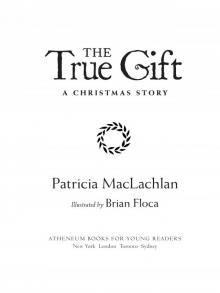 The True Gift
The True Gift